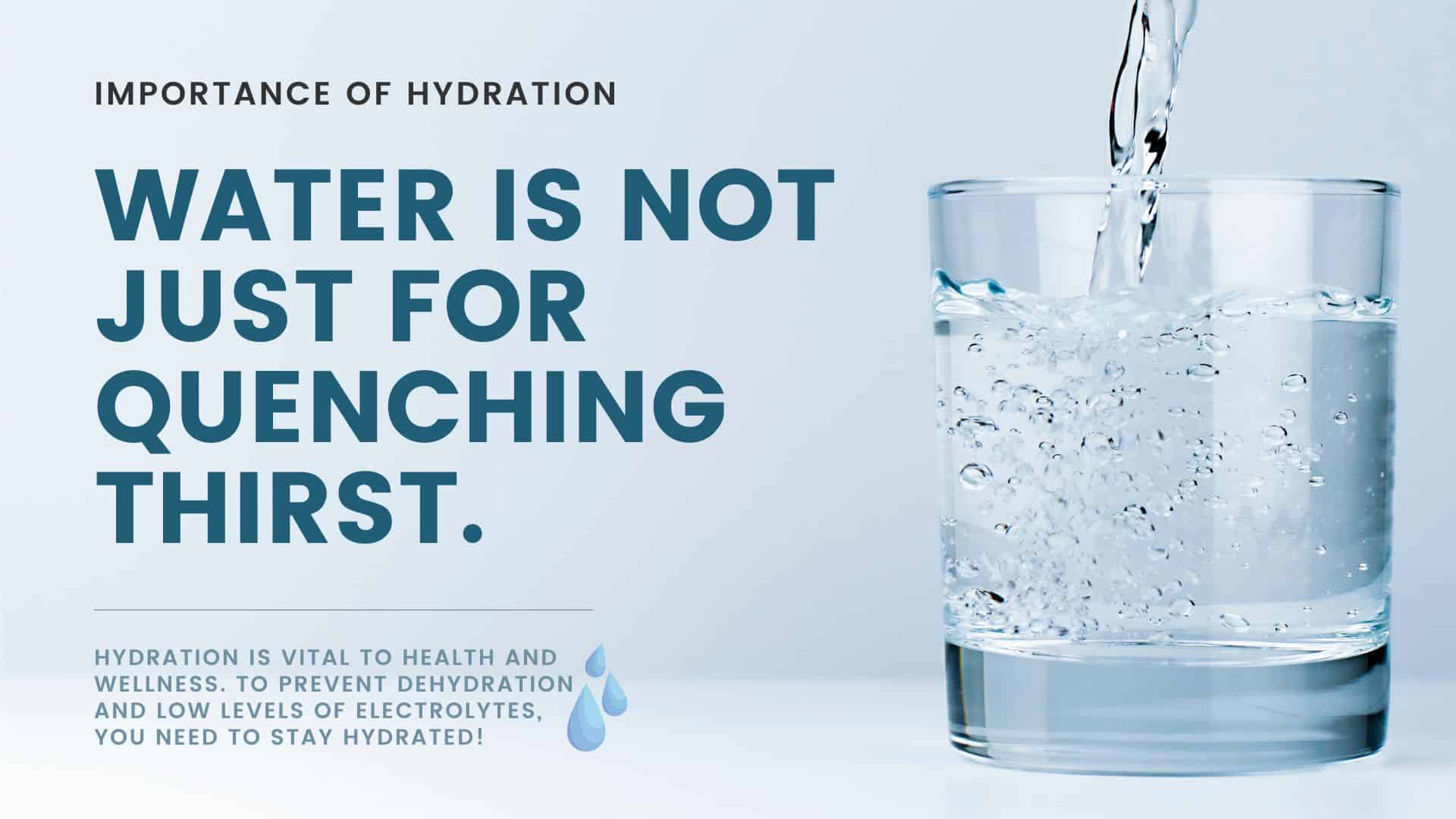Importance of Hydration And Drinking Water
Importance of hydration and drinking water for a healthy lifestyle.
Water is essential for human life. Our bodies lose water daily through sweat, urine, and breath. It is important to replenish this water by drinking fluids throughout the day. In fact, experts recommend drinking at least eight 8-ounce glasses of water per day.
Water is one of the most important things our bodies need. It helps us stay hydrated and function properly. Not only does adequate hydration keep you healthy, but it can also help improve your mood, energy level, and focus. Yet many people don’t drink enough water every day, which can lead to a number of health problems.
In this blog post, we will discuss the importance of hydration and why you need to drink more water every day!
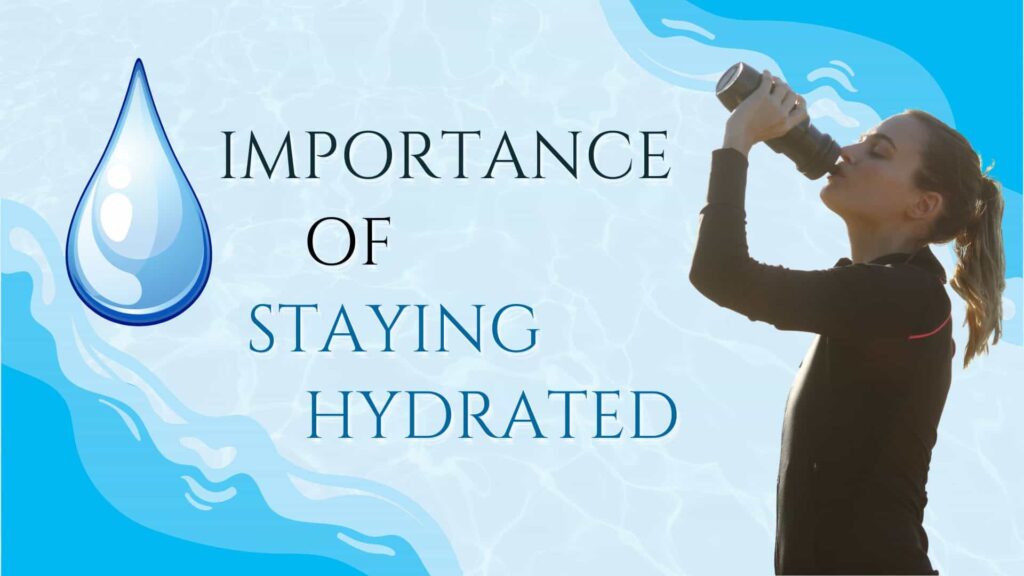
Why you need to drink more water every day
Importance of staying hydrated
Drinking enough fluids each day is essential for keeping your body healthy. Water is one of the most important fluids you can drink, as it helps keep you hydrated and functioning properly. Dehydration can cause a number of health problems, such as headaches, fatigue, and constipation. Drinking fluids throughout the day is important to stay hydrated and prevent these problems.
When you’re well-hydrated, you feel better overall! So make sure to drink plenty of fluids each day, especially water, to stay healthy and happy.
General benefits of hydration
The benefits of water are numerous. Not only does it keep you hydrated and healthy, but it can also help improve your overall function. Water is the best drink for quenching thirst and preventing dehydration. It’s also calorie-free, which makes it a good choice for people trying to weight loss or maintain a healthy weight.
Staying hydrated is important for many reasons. Water makes up the majority of our body, so we must replenish it.
Drinking water can:
- Help improve our physical performance by lubricating our joints, reducing fatigue, and helping to prevent muscle fatigue and cramps.
- It also helps to regulate our body temperature and provides a shock absorber for our brain and spinal cord.
- In addition, water is essential for many of the body’s metabolic processes, including digestion, absorption, and transportation of nutrients.
- Furthermore, staying hydrated can help improve our mental health performance and mood by keeping our energy levels up and reducing stress.
However, the benefits of water don’t stop there. Studies have also shown that drinking plenty of water can help prevent heart disease.
So next time you reach for a drink, make sure it’s good old H2O. Your body will thank you for it!
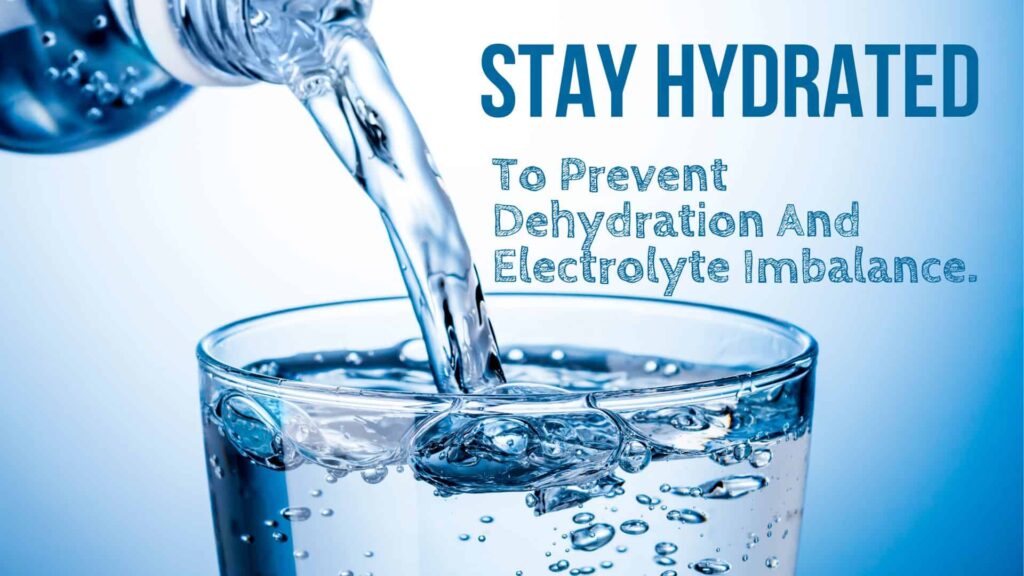
Signs of dehydration
Dehydration occurs when your body does not have enough fluid to function properly. It can be caused by losing too much fluid through sweating, vomiting, or diarrhea. It can also be caused by not taking in enough fluid, especially in hot weather or during exercise. Dehydration can lead to serious health problems, so it is important to know the signs and symptoms.
Early signs: of dehydration include thirst, dark urine, and dry skin.
If left untreated: dehydration can cause headaches, dizziness, fatigue, confusion and mental health problems.
In severe cases: it can lead to kidney stones, even organ failure and death by dehydration.
If you are experiencing any of these symptoms, it is important to seek medical attention immediately.
However, by taking simple steps to stay hydrated, you can prevent dehydration and keep your body healthy.
Benefits of water Vs other zero calories fluids, carbonated water or beverages
When it comes to fluid intake for quenching your thirst, you have a lot of options these days. Including bottled water, plain water, tap water, sports drink, carbonated water, carbonated drinks, zero-calorie fluids, and other beverages.
But what is the best option for staying hydrated?
While all fluids are necessary for good health, water is the best choice for quenching thirst and staying hydrated. There are many benefits of drinking water over other carbonated beverages or other zero-calorie carbonated fluids.
Carbonated beverages and fluids, such as soft drinks and juices, contain sugar and calories that can contribute to weight gain or obesity if consumed in large quantities. Carbonated fluids, such as soda and energy drinks, can actually increase dehydration because they contain caffeine and sugar. In addition, these drinks can have negative health consequences over time, such as increasing the risk for Type 2 diabetes.
While all carbonated water is calorie-free, not all types are created equal. Plain carbonated water is simply water that has been infused with carbon dioxide gas under pressure. club soda, on the other hand, is water that has been treated with minerals and additives. And seltzer water is plain carbonated water with a small amount of sodium.
Benefits of water
Other zero-calorie carbonated water or beverages may have some benefits, but they are often lacking in essential nutrients. Any carbonated drinks and beverages can also be expensive and may contain artificial sweeteners or other additives.
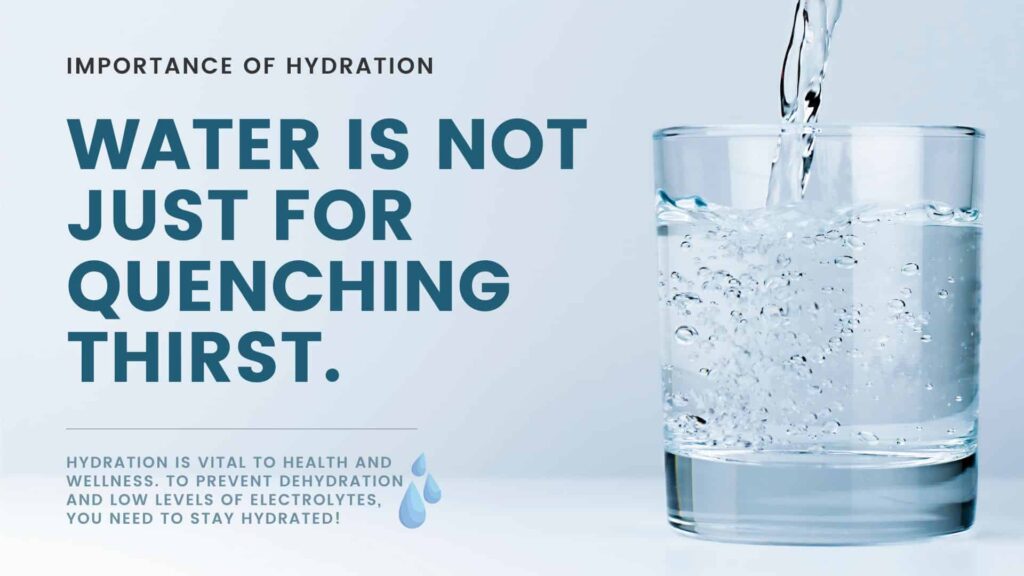
Water however, is the best choice for a zero-calorie beverage. It is essential for our bodies and has several benefits. Compared to other zero-calorie carbonated drinks or fluids, water is the best choice for overall health.
- First and foremost, water is essential for basic human life and helps keep the body functioning properly.
- Water is also a natural source of electrolytes, which are essential for maintaining proper hydration and bodily functions.
- Water is calorie-free and does not contribute to weight gain.
- Water(H2O) helps to regulate body temperature, lubricate joints, and protect organs and tissues.
- It is also a major component of blood, which carries oxygen and nutrients to cells.
- In addition, water hydrates our cells, flushes toxins from the body, aids in digestion, and prevents constipation. It is important to drink fluids throughout the day to stay hydrated, and water is the best fluid to drink for this purpose.
So if you’re looking for a healthy and refreshing drink, water is the best choice! it is a zero-calorie beverage and is inexpensive. The choice is yours!
Other important effects of water ( H2O ) on health
Regulating blood pressure
One of the ways water helps blood pressure is by equalizing the hydrostatic pressure. Hydrostatic pressure is created by the force of blood pressing against the walls of arteries. This pressure can be increased or decreased depending on how much water is in the bloodstream. When there is too little fluid, the hydrostatic pressure increases, and blood pressure rises.
However, when there is enough fluid, the hydrostatic pressure decreases, and blood pressure falls. In addition to equalizing hydrostatic pressure, water also helps to dilute the blood and reduce the concentration of salt and other electrolytes. This can help to prevent hypertension or high blood pressure. By ensuring that the body has enough water, we can help keep blood pressure at a healthy level.
Bladder function
The bladder is a muscular sac that stores urine until it is ready to be released from the body. The walls of the bladder are lined with a layer of smooth muscle that contracts and relaxes to control the release of urine. The bladder also has a sphincter, a ring of muscle that helps to keep urine stored in the bladder until it is ready to be released.
Water is an important part of bladder function because it helps to keep the bladder walls healthy and hydrated. When the bladder is full, the walls stretch, and the sphincter relaxes to allow urine to flow out of the body. If the bladder is not properly hydrated, the walls can become dried out and irritated, which can lead to urinary tract infections or other problems.
Water is essential for the proper function of the bladder. When the body is well hydrated, urine is produced at a normal rate and is relatively clear in colour. This allows the bladder to empty completely, which helps to prevent urinary tract infections.
In addition, water helps to dilute waste products in the urine, making them less likely to form crystals that can lead to kidney stones. For these reasons, it is important to drink plenty of fluids throughout the day, especially water. By keeping the bladder full and running smoothly, we can help to keep our entire urinary system healthy and free from problems.
Pelvic floor muscle function
Water is essential for the proper function of the pelvic floor muscles. These muscles play an important role in supporting the pelvic organs and controlling the urinary function and sphincter response.
The pelvic floor muscles are made up of tissue that is similar to other muscle tissue in the body. When the body is well-hydrated, all of the muscle tissue, including the pelvic floor muscles, functions better. With dehydration, like any other muscles, the pelvic floor muscles can get weak, which can cause muscle cramping, and decreased muscle function. It can lead to a number of problems, such as incontinence, prolapse, and sexual dysfunction.
Water helps to keep the pelvic floor muscles healthy and strong by providing them with the hydration they need. When the pelvic floor muscles are properly hydrated, they are better able to contract and relax. This helps to prevent incontinence and other problems.
Drinking enough water every day can help to prevent these problems and keep the pelvic floor muscles healthy and functioning properly.
Hydration for interstitial cystitis
Interstitial cystitis ( IC ) is a chronic condition that causes inflammation of the bladder wall. Symptoms include urinary frequency, urgency, and pain. While there is no cure for interstitial cystitis, managing symptoms is possible. One of the most important things you can do to manage your symptoms is to stay hydrated.
Drinking plenty of fluids helps to flush out bacteria and irritants from the bladder and reduce inflammation. It also helps to dilute urine, which can help to reduce urinary frequency and urgency. In addition, staying hydrated ensures that your body has the fluids it needs to heal any inflammation that does occur. As a result, maintaining a good hydration level is essential for managing some of the symptoms associated with interstitial cystitis.
In addition, staying hydrated helps keep the bladder and urinary tract healthy and can help reduce the frequency of urinary urgency and pelvic pain. It is important to drink plenty of fluids throughout the day, and to avoid any caffeinated and alcoholic beverages, as these can lead to dehydration and increase IC symptoms.
If you are experiencing symptoms of IC, it is important to speak to your doctor. They will be able to advise you on the best course of treatment for your individual case.
Hydration benefits for pelvic pain
Pelvic pain can be a debilitating condition that can significantly impact a person’s quality of life. Pelvic pain can have a variety of causes, but one often overlooked factor is dehydration.
Dehydration can cause the body to become tense and irritable, which can lead to muscle spasms and pain. It can also contribute to inflammation, which can exacerbate existing pain. When the body is dehydrated, it cannot function properly. Furthermore, dehydration can cause the body to produce excess urine frequency, placing additional strain on the bladder and further exacerbating pain.
In order to reduce pelvic pain, it is important to stay hydrated by drinking plenty of water throughout the day. Not only will this help to ease muscle pain and prevent cramps, but it will also help to reduce pressure on the bladder and improve overall kidney function.
Hydration is crucial for relieving pelvic pain as it helps to reduce inflammation and relax the muscles. Drinking plenty of water and other fluids can also help to flush out any toxins that may be contributing to the pain.
In addition, staying hydrated helps to keep the tissues in the pelvis supple and well-lubricated, which can reduce friction and pain during intercourse.
By staying hydrated, you can help to reduce pelvic pain and improve your overall health.
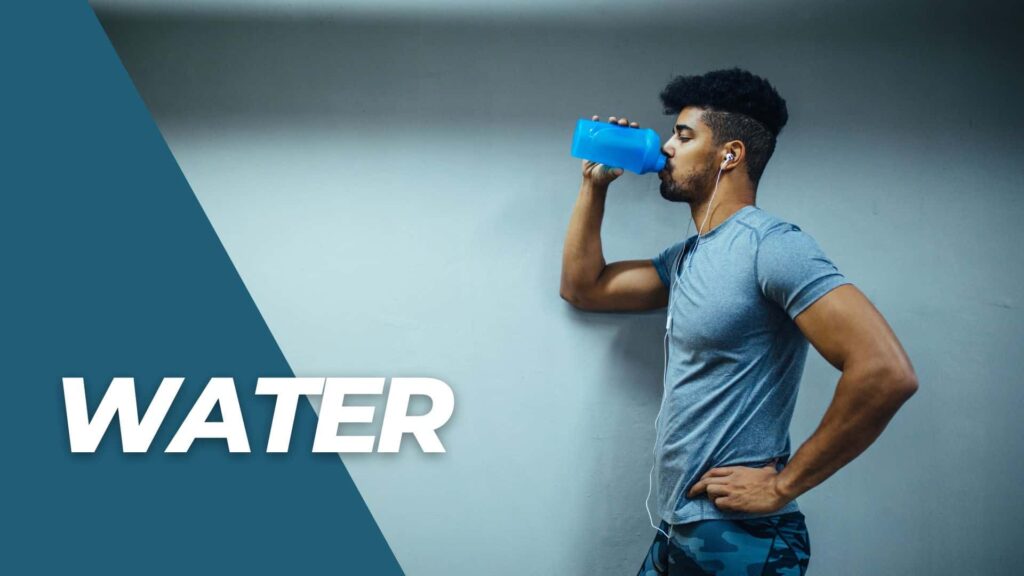
How much water should a person drink every day?
How much water a person needs to drink every day depends on a number of factors. Most health experts agree that everyone should drink at least eight 8-ounce glasses of water per day. This amounts to about 2 liters or half a gallon.
Some people may need to drink more, depending on their level of activity, the climate they live in, and their overall health. For example, people who exercise regularly or spend time in hot weather will need to drink more water than those who are sedentary or live in cooler climates.
Additionally, people with certain health conditions may need to drink more or less water than the general recommendation. Therefore, listening to your body and drinking enough water to stay properly hydrated is important.
How to calculate the amount of water a person requires for a healthy bladder?
Most people know that it’s important to stay hydrated, but did you know that there’s a science to it?
There are a few factors to consider when calculating the optimal hydration a person requires for a healthy bladder.
- The first factor is the person’s body weight. A person needs about half an ounce of water for every pound they weigh. So, a person weighing 150 pounds would need about 75 ounces of water daily.
- The second factor to consider is the person’s activity level. A very active person will need more water than someone who is sedentary. An active person, like an athlete, may need up to twice as much water as someone who is sedentary.
- The third factor to consider is the climate. A person who lives in a hot climate will need more water than someone who lives in a cooler climate. A person who lives in a hot climate may need up to three times as much water as someone who lives in a cooler climate.
How to ensure you’re drinking enough water -tips for staying hydrated?
Most people know that it’s important to drink plenty of water, but many still don’t make it a priority. Unfortunately, even mild dehydration can cause dry mouth, fatigue, headaches, and other problems. So how can you make sure you’re getting enough H2O?
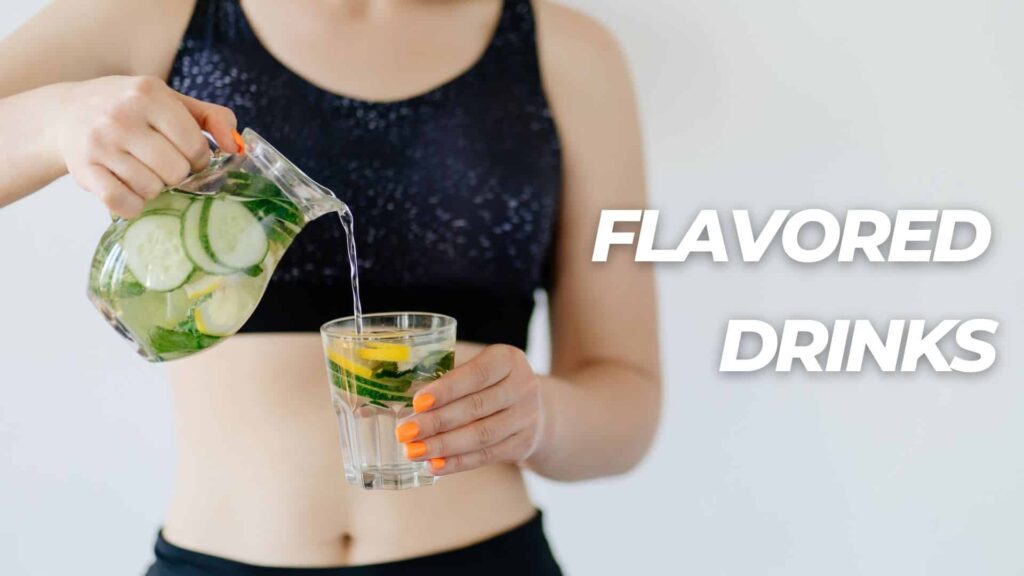
Staying hydrated is essential for good health, yet it can be easy to forget to drink enough water throughout the day. It’s important to make sure you’re drinking enough water every day. Here are a few ways to make sure you stay hydrated:
- Drink a glass of water first thing in the morning.
- Carry a water bottle with you throughout the day and take regular sips. This way, you’ll always have water on hand when you get thirsty.
- Make sure you’re drinking water before meals.
- Drink a glass of water before bed.
- And if you’re working out, be sure to drink additional water to replenish what you’ve lost through sweat. It’s also important to drink water before, during, and after exercise, as sweat can cause you to have fluid loss quickly.
- You can also keep track of how much water you’re drinking by keeping a log or setting reminders on your phone.
- If you’re struggling to drink enough water, try adding some flavor with a slice of lemon, cucumber, orange slice or mint etc. You can also try natural sparkling water or herbal tea.
- Another way to stay hydrated is to eat foods that contain a lot of water, such as fruits, fresh fruit juices and vegetables.
- In addition, avoid drinks that can contribute to dehydration, such as sugary foods/fluids, caffeinated beverages and alcohol.
By following these simple tips, you can make sure you’re getting the fluids your body needs to function at its best.
By making a few small changes in your daily routine and being mindful of your daily water intake, you can help ensure that your body has everything it needs to stay healthy and function properly.
It can help ensure that you’re getting the fluid you need to stay healthy and hydrated. So next time you reach for a soda or coffee, remember that nothing beats good old-fashioned water when it comes to taking care of your body!

Cynthia Pathipati – Registered Physiotherapist
Cynthia Pathipati completed her bachelor’s in physiotherapy and is a qualified Registered Physiotherapist in good standing with the College of Physiotherapists of BC with more than 15 yrs of experience. She has Post-Graduate Credentials and Certifications as well as extensive knowledge experience in treating pelvic floor, orthopedic, neurological, vestibular and pain conditions.

